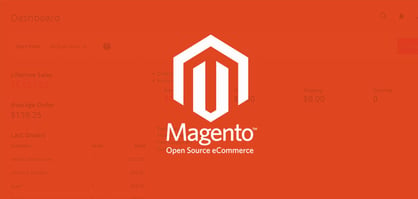Top 5 Ecommerce Platforms: Powering Startup Success
Top 5 Ecommerce Platforms: Powering Startup Success
4 min read
 Tim Bucciarelli
:
March 6, 2023
Tim Bucciarelli
:
March 6, 2023

SaaS-based eCommerce platforms using lookalike design templates are the index funds of the eCommerce world. They help furniture businesses more easily get online with a deep selection of innovative eCommerce functionalities. In this article, we’ll cover just a few ways the following popular eCommerce platforms can help furniture companies become pioneers in the industry by streamlining the backend of their business, improving site search, inviting complex customizations, and leveraging 3D and AR:

Magento Open Source has been a popular solution in the eCommerce world for a long time. It's known for its flexibility and scalability, making it an excellent choice for furniture businesses looking to expand. Here are some key features:
Customization: Magento Open Source offers unparalleled customization options. You can design your online store to match your brand's identity, and you have full control over the layout and functionality. This is crucial for furniture businesses with distinctive aesthetics.
Scalability: Magento is built to handle high volumes of traffic and large inventories. Whether you're a small furniture retailer planning to grow or a large business with extensive product catalogs, Magento can scale with your needs.
Community Support: Magento boasts a vast and active community of developers and users. This means you can tap into a wealth of resources, including plugins, extensions, and community-driven solutions. If you have questions or run into issues, chances are someone in the community has encountered and solved them before.

If you're looking for a premium eCommerce solution, Adobe Commerce might be the right fit. This platform offers a seamless blend of B2B and B2C capabilities, making it a great choice for furniture businesses with a diverse customer base. Key features include:
Advanced Marketing Tools: Adobe Commerce provides a suite of advanced marketing tools that can help your furniture business stand out. From targeted email campaigns to personalized product recommendations, you can engage your audience effectively.
Personalization: Personalization is crucial in the furniture industry, where individual preferences play a significant role in buying decisions. Adobe Commerce allows you to create personalized shopping experiences based on user behavior and preferences, increasing the likelihood of conversions.
Integrated Inventory Management: Managing your furniture inventory across multiple channels is simplified with Adobe Commerce. You can efficiently track stock levels, update product information, and synchronize inventory data with your physical stores.

BigCommerce is a user-friendly platform that doesn't skimp on features. It's perfect for small to mid-sized furniture businesses that want a straightforward yet powerful eCommerce solution. Key features include:
Responsive Themes: BigCommerce offers a wide selection of responsive themes that are ideal for showcasing furniture. These templates are designed to be visually appealing and mobile-friendly, ensuring your products look great on any device.
SEO-Friendly: Furniture businesses can benefit from BigCommerce's built-in SEO tools, which help improve your search engine rankings. This is vital for attracting organic traffic and driving more potential customers to your online store.
Payment Options: BigCommerce supports various payment gateways, allowing you to offer a convenient and secure checkout experience to your customers. This flexibility is crucial for catering to a diverse customer base with varying payment preferences.

Shopify is a household name in the eCommerce industry, known for its ease of use and reliability. It's a great choice for both newcomers and established furniture businesses. Key features include:
User-Friendly: Shopify's intuitive interface makes it accessible to users with varying levels of technical expertise. Setting up your furniture store is a breeze, and you can start selling online quickly.
App Store: With thousands of apps and integrations available in the Shopify App Store, you can enhance your store's functionality as needed. This means you can integrate tools for inventory management, marketing, and customer support seamlessly.
Mobile Optimization: As mobile shopping continues to rise, Shopify ensures that your furniture store is mobile-optimized out of the box. This means your website will look and perform well on smartphones and tablets, providing a smooth shopping experience for mobile users.

If you're already using WordPress for your furniture business's website, WooCommerce might be the ideal choice. It seamlessly integrates with WordPress, allowing you to add eCommerce functionality to your existing site. Key features include:
WordPress Integration: WooCommerce seamlessly integrates with WordPress, the world's most popular content management system. If your furniture business already has a WordPress website, you can add eCommerce functionality without starting from scratch.
Flexibility: WooCommerce is highly customizable. You can tailor your store's appearance and functionality using a wide range of extensions and themes. This flexibility allows you to create a unique and branded online presence.
Cost-Effective: WooCommerce is known for being budget-friendly. It's a cost-effective option for businesses that want to enter the world of online retail without incurring substantial upfront expenses. This makes it ideal for smaller furniture businesses looking to expand their online presence.
Choosing the right eCommerce platform for your furniture business can be overwhelming, but breaking it down into key criteria can simplify the decision-making process. Here's a simple guide for evaluating eCommerce platforms:
By carefully considering these factors and comparing them across different eCommerce platforms, you can make an informed decision that aligns with your furniture business's goals and needs. Whether you're a budding furniture entrepreneur or an established retailer, choosing the right eCommerce platform is a critical step towards achieving online success.
Leveraging the capabilities of a highly customizable platform like Magento is only the first step for setting your furniture company apart from the morass of sameness. Once you know the capabilities you want your store to have, it'll likely be time to replatform your site to the platform of your choosing. IronPlane is here to help with that process — take a look at our replatforming guide below.
Curious about what is involved in a Magento implementation? Contact the experts at IronPlane for a free consultation, or read:
Photo credit: Phillip Goldsberry on Unsplash

Top 5 Ecommerce Platforms: Powering Startup Success

In today's digital age, having a user-friendly eCommerce platform is crucial for business success. At IronPlane, we understand the importance of choosing the right platform that aligns with your business needs and technical expertise.

We compare Magento, Adobe Commerce, BigCommerce, and Shopify in depth, examining how each caters to automotive eCommerce merchants.